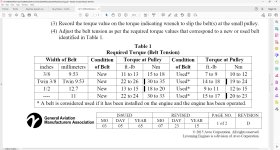When I tension my alternator belt so that I get 10 to 12 ft-lbs of torque before belt slip (per Lycoming s. i. 1129A), the alternator makes a "grinding" noise. Roughly 5 years and 450 hours on this alternator. I'm assuming the bearing is failing and the unit needs to be replaced. Anyone ever experienced this?
For what it's worth, when I loosen the belt to get 6 to 8 ft-lbs before slipping, the noise is gone. Using the "old" rules of thumb on belt tension (deflection, difficulty to twist 90 degrees, etc.), the belt is "tight enough", and it doesn't slip under load.
For what it's worth, when I loosen the belt to get 6 to 8 ft-lbs before slipping, the noise is gone. Using the "old" rules of thumb on belt tension (deflection, difficulty to twist 90 degrees, etc.), the belt is "tight enough", and it doesn't slip under load.





